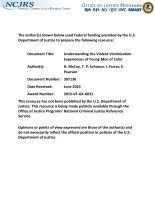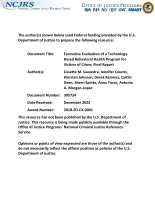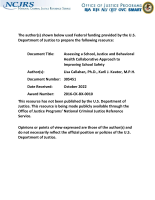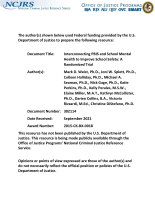Mental health services
A randomized controlled trial of Co-response for Mental Health Calls for Service to the Police in Fort Collins, CO
Expanding Mental Health Diversion Opportunities: A Prospective Evaluation of the Los Angeles County Intake Booking Diversion Program
Understanding the Violent Victimization Experiences of Young Men of Color
It's a Marathon Not a Race: Exiting the Commercial Sex Trade
Just Science Podcast: Just Family Support During Death Investigations
Campus Sexual Assault Responses (CSAR): Informing Trauma-Informed Policies, Protocols, and Training
Sexual violence is a significant criminal justice problem with long-term effects for its victims. In particular, sexual assault on or related to college campuses across the United States presents a growing public health and economic burden, starting with significant impacts on academic outcomes.
See the YouTube Terms of Service and Google Privacy Policy
Formative Evaluation of a Technology-Based Behavioral Health Program for Victims of Crime, Final Report
School Safety: Large, Metropolitan District Tests Various School-Based Mental Health Services
School Safety: Large, Metropolitan District Tests Various School-Based Mental Health Services
An assessment of the relative benefits of expanded and enhanced mental health services yields mixed results, underscores implementation challenges.
Assessing a School Justice and Behavioral Health Collaborative Approach to Improving School Safety
The Missouri Prevention Center: A Multidisciplinary Approach to Reducing the Societal Prevalence and Burden of Youth Mental Health Problems
School Threat Assessment Versus Suicide Assessment: Statewide Prevalence and Case Characteristics
Signs of Success for Probationers and Parolees With Mental Health and Substance Abuse Problems
Past Year Technology-Involved Peer Harassment Victimization and Recent Depressive Symptoms and Suicide Ideation Among a National Sample of Youth
School Safety and School-Based Mental Health Services in a Large Metropolitan School District
In search of: Police responses to those experiencing homelessness
Postinjury Engagement With the Police and Access to Care Among Victims of Violent Street Crime: Does Criminal History Matter?
The Effects of Practitioner-Delivered School-Based Mental Health on Aggression and Violence Victimization in Middle Schoolers
Identifying the Feasibility and Acceptability of Conducting Longitudinal Outcome Evaluation Research with Adult Survivors of Sex Trafficking and Their Perceptions of a Comprehensive Service Model
An Ecological Model of Risk and Protection for Delinquency and Juvenile Justice Involvement among Maltreated Youth: A Longitudinal Study
Interconnecting PBIS and School Mental Health to Improve School Safety: A Randomized Trial
Tip Lines - Roundtable Discussion, NIJ Virtual Conference on School Safety
On February 16-18, 2021, the National Institute of Justice hosted the Virtual Conference on School Safety: Bridging Research to Practice to Safeguard Our Schools. This video presents a roundtable discussion from the conference.
See the YouTube Terms of Service and Google Privacy Policy
Preparing for and Responding to Threats and Violence - Breakout Session, NIJ Virtual Conference on School Safety
On February 16-18, 2021, the National Institute of Justice hosted the Virtual Conference on School Safety: Bridging Research to Practice to Safeguard Our Schools. This video includes the following presentations:
See the YouTube Terms of Service and Google Privacy Policy
Alternatives to Traditional School Discipline - Breakout Session, NIJ Virtual Conference on School Safety
On February 16-18, 2021, the National Institute of Justice hosted the Virtual Conference on School Safety: Bridging Research to Practice to Safeguard Our Schools. This video includes the following presentations:
See the YouTube Terms of Service and Google Privacy Policy









